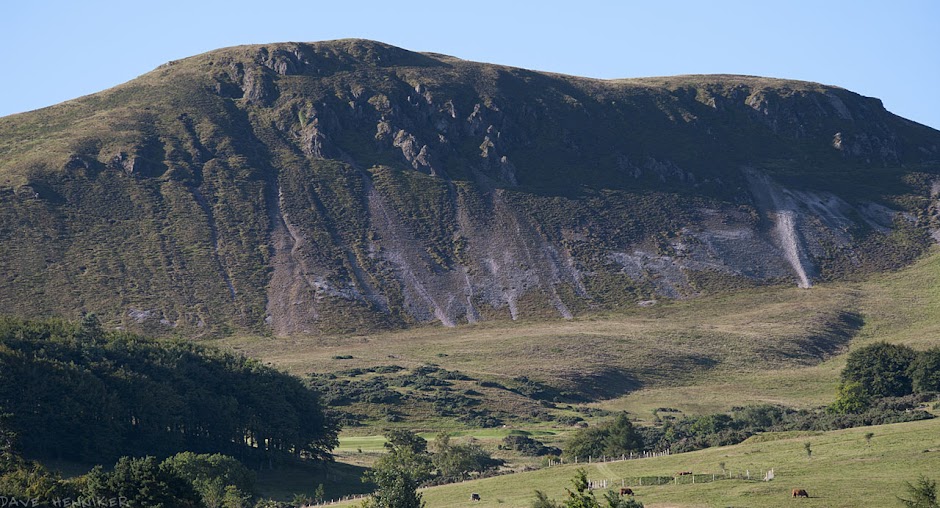Douglas's van could only seat two passengers in the cabin, so Alison and Fiona sat inside. Paul, Iain and I meanwhile sat in the back with all the camping gear and luggage; we were completely open and exposed to the elements, although fortunately the weather was set fair. It was a great feeling sitting in the back of the pick-up with the rushing breeze blowing our hair back. We felt cool, metaphorically and then literally, as the journey progressed through the wynding, open roads of the Borders. After we travelled through Penicuik we passed Leadburn Junction and made our way to Eddlestone where we turned right for the drive over the gentle Meldon Hills and then on through old Lyne Station, Stobo Castle, Stobo Kirk and the tiny hamlet of Stobo.
To keep sheltered from the wind we had to snuggle up together and kept as low down in the vehicle as possible. Fortunately we didn't come across any policemen en-route-although it was a laxer age, they might well have stopped us if they'd seen us sitting in the back of an open vehicle.
Stobo is a sylvan spot in Peebleshire set amongst the gentle and beautiful Borders landscape. It's little known unless you are perhaps familiar with the early works of John Buchan. Forty years before James Patrick McIntosh, the great Dundee artist painted a well known painting of the kirk; the painting is in the collection of Edinburgh's City Art Centre. Today, Stobo is a little better known because of the exclusive health spa at Stobo Castle.
 |
| Stobo Church (James Patrick McIntosh) |
We had managed to borrow a large tent from the church - I think it belonged to Oxgangs Evangelical Church rather than Charlotte Chapel - I note from my diary that it was Fiona who got it for us. I had borrowed a sleeping bag from my grandparents and bought in lots of food from The Store, including a few flagons of cider - looking back it seems amazing that teenagers could buy alchohol and tobacco so easily.
| Paul Forbes; Peter Hoffmann; and Iain Hoffmann trying to keep up! (Heather Robertson) |
The farmer gave us the go ahead to camp in his field. I note from my diary that after setting up the tent that evening (with a hand from Douglas) we thereafter managed a swim in the River Tweed followed by a good supper washed down with cider - a deadly combination! According to the diary we were tipsy - a rather quaint word. Paul had clearly consumed too much and was sick. I recall him swearing that he'd seen a shooting star during the night, but we were dubious, much to his dismay.
Normally the problem with camping in Scotland is the weather - people often get washed out and have to give up and go home. Ironically, we had some difficulty with the weather too, but for the opposite reason. We chose one of those very rare occasions when Scotland had a heatwave!
The week we'd chosen to go camping was the hottest of the summer. In the following days the temperature was mostly in the eighties. Indeed it was so hot that most of us began to suffer from heatstroke. By the following Tuesday our grandparents were good enough to drive down to take Alison and Iain back home to The Stair to recover. The group photograph shows how badly Alison was suffering. Again, from my diary I noticed that I too was sick that evening, noting that I was feeling crap!
| Grandfather (William Robertson); Alison Blades; Paul Forbes; Fiona Blades; Grandmother (Josephine Robertson); Peter Hoffmann; and Iain Hoffmann (Heather Robertson) |
| Paul Forbes; Peter Hoffmann; and Iain Hoffmann (Heather Robertson) |
| Paul Forbes and Peter Hoffmann diving; Iain Hoffmann watching, learning and admiring-not! Iain was the diver par excellent! (Heather Robertson) |
| Peter Hoffmann (Heather Robertson) |
Peebles for pleasure runs the old motto and we sauntered around enjoying games of putting and of all things playing with swans down by the River Tweed. I assume we got a country bus back to Stobo as I suspect walking the six miles back to our camp-site would have been beyond us. Fiona, Paul and I stayed on for the rest of the week. We gathered firewood from the local wood, swam, conversed, played cards and generally lapped up the sun and the experience, before Douglas kindly came down to collect us and drive us back to The Stair.
When that summer of 1972 came to an end it marked a point in time - a line in the sand - the bell was ringing for the last lap and the end of my boyhood. It wasn't long afterwards, indeed only a few weeks later that I decided to leave school. A few months later, at the start of winter I left The Stair, only to return for occasional visits.
Summer Has Gone’
I have tidings for you,
The stag bells;
Winter pours;
Summer has gone
Wind is high and cold;
The sun is low;
Its course is short;
The sea runs strongly…
Cold has seized
The wings of birds;
Season of ice.
These are my tidings
(Early Irish Lyrics, Oxford 1956)



No comments:
Post a Comment